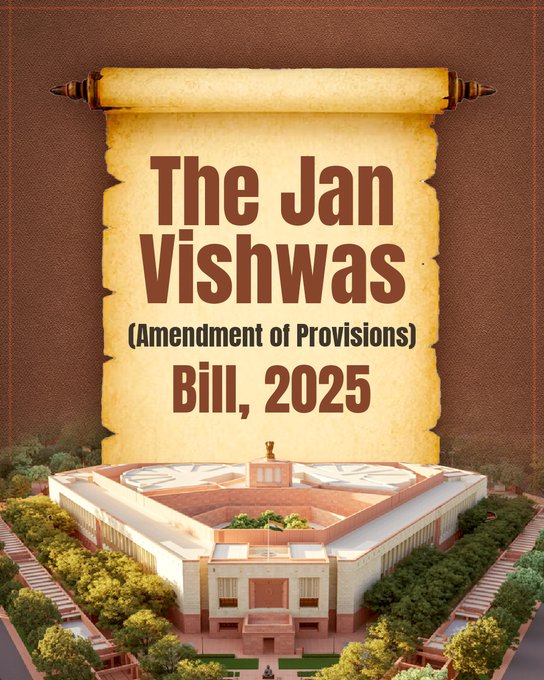
India’s legal framework is vast and complex, containing several outdated and excessive criminal provisions.
Over time, criminal law has extended beyond its core purpose of addressing grave social harm, and is now used to regulate routine or technical lapses.
This phenomenon is termed “Over-Criminalisation”.
Result → uncertainty for businesses, harassment of citizens, overburdening of judiciary, and decline in trust in governance.
The Government of India has therefore initiated reforms through the Jan Vishwas Bills (2023 & 2025), aimed at rationalising penalties and modernizing India’s legal system.
Problem of Over-Criminalisation
- India has 882 central laws, of which 370 contain criminal provisions.
- These 370 laws define over 7,305 criminal offences.
- More than 75% of these crimes fall outside core criminal areas (theft, assault, murder) and exist in taxation, shipping, municipal governance, and financial institutions.
Disproportionate Punishments:
- Minor or routine defaults can invite imprisonment.
- Example: Milking a cow on the street or not giving a pet dog proper exercise are punishable offences.
- Such laws → wide discretion to authorities, scope for arbitrary use of power, and violation of proportionality principle.
Impact of Over-Criminalisation
- On Businesses:
- 1,536 business laws exist; over half have imprisonment clauses.
- Of 69,233 compliances, 37.8% involve jail terms.
- Many offences carry minimum 1-year imprisonment.
- Creates barriers to entrepreneurship, reduces investment, slows growth, discourages job creation.
2. On Judiciary:
- 3.6 crore pending criminal cases (Aug 2025), 2.3 crore pending for >1 year.
- Minor cases clog courts → delays in serious crime trials.
- Commerce Ministry (2023 Bill): minor defaults “clog justice delivery system and push serious cases to back burner.”
The Jan Vishwas Reform Journey
Jan Vishwas Bill, 2023:
- Decriminalised 183 provisions across 42 central laws.
Jan Vishwas (Amendment of Provisions) Bill, 2025:
- Amends 355 provisions across 16 laws.
- 288 provisions decriminalised (Ease of Doing Business).
- 67 provisions amended (Ease of Living).
Key Features of Jan Vishwas 2.0 Bill
- Warnings & Improvement Notices:
- First-time offenders → warnings / improvement notices instead of jail.
- Example: Legal Metrology Act → earlier ₹1 lakh fine; now improvement notice for first-time.
2. Removal of Imprisonment Clauses:
- Procedural/technical defaults decriminalised.
- Example: Electricity Act, 2003 → 3 months jail replaced with fine ₹10k – ₹10 lakh.
3. Rationalisation of Penalties:
- Proportionate & predictable penalties.
- Automatic 10% increase every 3 years.
- Higher fines for repeat offenders.
Implications of the Reform
- Ease of Doing Business → reduces risks, encourages investment.
2. Ease of Living → citizens spared harsh punishments, builds trust.
3. Judicial Relief → fewer minor cases, faster serious crime trials.
4. Regulatory Simplification → automatic penalty increase ensures predictability.
Challenges & Criticisms
- Balancing deterrence vs leniency: too much relaxation may encourage violations.
- Implementation hurdles: effectiveness depends on regulators and awareness.
- Partial reform: 370 laws still contain criminal provisions.
- Arbitrary application risk remains unless monitored properly.
Conclusion
The Jan Vishwas Bill, 2025 is a landmark step in modernising India’s legal system, shifting from punitive to trust-based governance.
It is expected to improve business climate, reduce judicial backlog, and strengthen citizen–state trust.
However, real success depends on consistent enforcement and striking balance between trust and deterrence.
Future reforms like Jan Vishwas 3.0 must further rationalise laws to make India’s governance framework modern, fair, and citizen-friendly.
UPSC Relevance:
- GS-II (Polity & Governance): Legal reforms, judicial pendency.
- GS-III (Economy): Ease of doing business, investment.
- Essay Paper: Rule of law, governance.
- Ethics (GS-IV): Proportionality in punishment.
